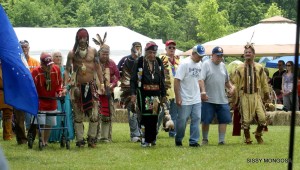Indiana at 200 (62): Miami Denied Recognition
by Andrea Neal
In 1897, an assistant attorney general made a legal error that cost the Miami Nation of Indiana its federal recognition as a tribe. They’ve been fighting ever since to win it back.
“Our people are as upset now as they were 100 years ago,” declares Chief Brian Buchanan.
It’s a story that began not long after Indiana achieved statehood, when settlers came flooding into the state with their eyes on land already occupied by Potawatomi, Delaware, Miami and other Indian nations. The government’s formal policy was removal. Under the Indian Removal Act of 1830 and a succession of treaties, Indiana’s Native Americans were pushed westward to present-day Kansas and Oklahoma.
The Miami fought to stay in Indiana during the 19th century and were split in two when the U.S. government forcibly removed about half of them in 1846. Under an 1840 treaty, the Miami ceded virtually all of their commonly held land in exchange for $550,000 in annuity payments.
Through this treaty and earlier ones, several individual Miami were awarded land, and they and their families were exempted from removal, forming the nucleus of the Miami Nation of Indiana. Those sent to Kansas eventually relocated to Oklahoma and today are called the Miami Tribe of Oklahoma, one of 566 federally recognized tribes.
For decades, the Miami of Indiana were treated by the government like their western Miami counterparts, exempt from federal taxes, free to hunt and fish without a license and eligible to attend federal Indian schools.
Immediately following removal, Miami lands in Indiana were illegally taxed. Hoping to recover past payments, they appealed to the Department of the Interior, which oversees tribal matters through its Bureau of Indian Affairs. The case was referred to Assistant Attorney General Willis Van Devanter, a Hoosier who would go on to become a Supreme Court justice.
As part of his decision on the tax case, Van Devanter concluded that the Indiana Miami were “no longer a tribe” under a law called the Dawes Act and were U.S. citizens, thus ineligible for tribal recognition – a decision the government later admitted was based on a flawed application of the law.
Within four decades of his decision, the remaining Miami lands in Indiana virtually disappeared. Indiana Miami could no longer attend federal Indian schools, exercise treaty rights or continue many important cultural practices, including speaking their language.
In 1978, the Department of the Interior set up a new process for acknowledging Indian tribes. The Miami applied for recognition but were denied on grounds they could not prove continuous existence of a tribal community with functioning political system. The Miami challenged the ruling in court without success. They also asked Congress for legislation restoring their tribal rights but failed to muster enough support.
The Miami today operate on a barebones budget, sustained largely by private donations and bingo nights held at the Tribal Complex in the old Peru High School building.
Though its relationship to the federal government is fractured, the tribe’s identity as a sovereign nation is intact. Tribal council meets monthly and holds a general meeting open to the public twice a year. An annual powwow is held every June at the Miami Living Village in Parke County, which features native drumming, singing, dancing and storytelling.
Dr. Scott M. Shoemaker, director of the tribe’s cultural and historic preservation office, says teaching the once dormant “Myaamia” language at summer camp and other venues has been a recent focus because it is through transmission of language that culture is passed on to newer generations.
Buchanan says members will continue to do what they can through the political system to win back their tribal recognition. He invites fellow Hoosiers to join them in the struggle by contacting their congressional representatives and by attending or financially supporting the many events sponsored by the Miami each year.
Directions: Powwow takes place at Miami Living Village 3 miles east of Raccoon Lake State Recreation Area, 11515 East US 36, Rockville.
djv


Comments...